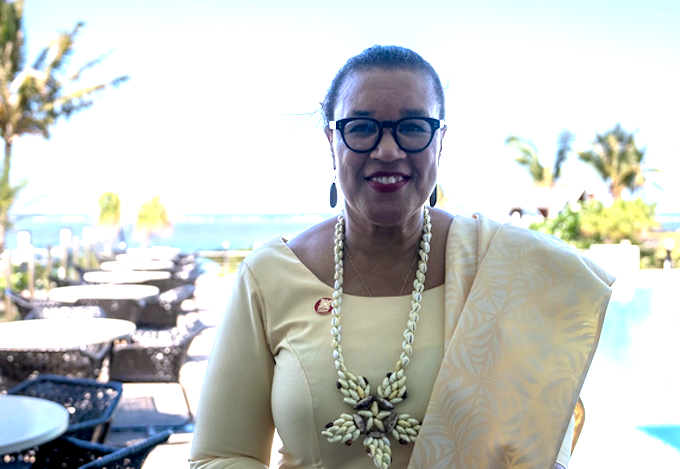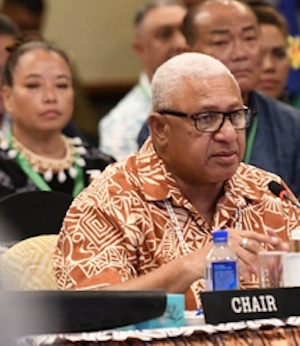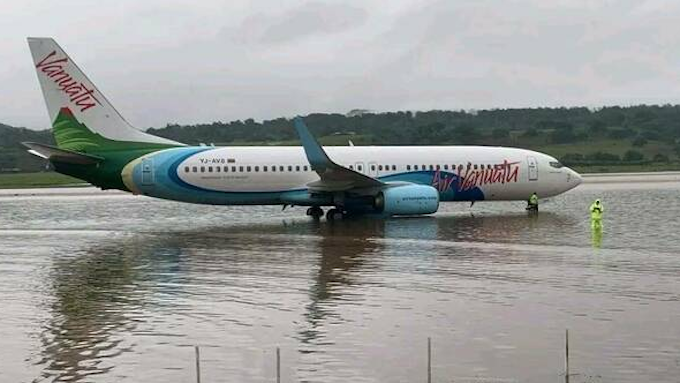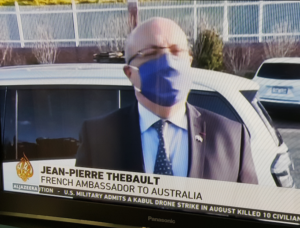By Sialai Sarafina Sanerivi in Apia
The Ocean Declaration that will be agreed upon at the Commonwealth Heads of Government Meeting (CHOGM) this week will be known as the Apia Ocean Declaration.
In an exclusive interview with the Samoa Observer, Commonwealth Secretary-General Patricia Scotland said members were in a unique position to bring their voices together for the oceans, which have long been neglected.
“The Apia Ocean Declaration aims to address the rising threats to our ocean faces, especially from climate change and rising sea levels,” she said.
Commonwealth pushes for ocean protection with historic Apia Ocean Declaration. Video: Samoa Observer
Scotland, reflecting on her tenure as Secretary-General, noted the privilege of serving the Commonwealth, a diverse family of 56 countries comprising 2.7 billion people.
“I am very much the child of the Commonwealth. With 60 percent of our population under 30 years, we must prioritise their future.”
Scotland reflected that upon assuming her role, she recognised immediately that addressing climate change would be a key priority for the Commonwealth.
“Why? Because we have 33 small states, 25 small island states and we were the ones who were really suffering this badly,” she said.
Pacific a ‘big blue ocean state’
“We also knew in 2016 that nobody was looking at the oceans. Now, the Pacific is a big blue ocean state.
“But it’s one of the most under-resourced elements that we have. And yet, look at what was happening. The hurricanes and the cyclones were getting bigger and bigger.
“Why? Because our ocean had absorbed so much of the heat, so much of the carbon, and now it was starting to become saturated. So before, our ocean acted as a coolant. The cyclone would come, the hurricane would come, they’d pass over our cool blue water, and the heat would be drawn out.”
The Apia Ocean Declaration emerged from a pressing need to protect the oceans, especially given the devastating impact of climate change on coastal and island nations.
“We realised that while many discussions were happening globally, the oceans were often overlooked,” Scotland remarked.
“In 2016, we recognised the necessity for collective action. Our oceans absorb much of the carbon and heat, leading to increasingly severe hurricanes and cyclones.”
Scotland has spearheaded initiatives that brought together oceanographers, climatologists, and various stakeholders.

Worked in silos ‘for too long’
“We worked in silos for too long. It was time to unite our efforts for the ocean’s health.
“That’s when we realised that nobody had their eye on our oceans, but of the 56 Commonwealth members, many of us are island states, so our whole life is dependent on our ocean. And so that’s when the fight back happened.”
This collaboration resulted in the establishment of the Commonwealth Blue Charter, a significant framework focused on ocean conservation.
“Fiji’s presidency at the UN Oceans Conference was a turning point. Critics said it would take years to establish an ocean instrument, but we achieved it in less than ten months.”
“We are not just talking; we are implementing solutions.”
Scotland also addressed the financial challenges faced by many small island states, particularly regarding climate funding.
“In 2009, $100 billion was promised by those who had been primarily responsible for the climate crisis, to help those of us who contributed almost nothing to get over the hump.
Hard for finance applications
“But the money wasn’t coming. And in those days, many of our members found it so hard to put those applications together.”
To combat this issue, the Commonwealth established a Climate Finance Access Hub, facilitating over $365 million in funding for member states with another $500 million in the pipeline.
“But this has caused us to say we have to go further,” she added.
“We’re using geospatial data, we have to fill in the gaps for our members who don’t have the data, so we can look at what has happened in the past, what may happen in the future, and now we have AI to help us do the simulators.
“The Ocean Ministers’ Conference highlighted the importance of ensuring that countries at risk of disappearing under the waves can maintain their maritime jurisdiction,” Scotland asserted.
“The thing that we thought was so important is that those countries threatened with the rising of the sea, which could take away their whole island, don’t have certainty in terms of that jurisdiction. What will happen if our islands drop below the sea level?
“And we wanted our member states to be confident that if they had settled their marine boundaries, that jurisdiction would be set in perpetuity. Because that was the biggest guarantee; I may lose my land, but please don’t tell me I’m going to lose my ocean too.
Target an ocean declaration
“So that was the target for the Ocean Ministers’ Conference. And out of that came the idea that we would have an ocean declaration.
“It is that ocean declaration that we are bringing here to Samoa. And the whole poignancy of that is Samoa is the first small island state in the Pacific ever to host CHOGM. So wouldn’t it be beautiful if out of this big blue ocean state, this wonderful Pacific state, we could get an ocean declaration which could in the future be able to be known as the Apia Ocean Declaration? Because we would really mark what we’re doing here.
“What the Commonwealth has been determined to do throughout this whole period is not just talk, but take positive action to help our members not only just to survive, but to thrive.
“And if, which I hope we will, we get an agreement from our 56 states on this ocean declaration, it enables us to put the evidence before everyone, not only to secure what we need, but then to say 0.05 percent of the money is not enough to save our oceans.
“Oceans are the most underfunded area.
“I hope that all the work we’ve done on the Universal Vulnerability Index, on the nature of the vulnerability for our members, will be able to justify proper money, proper resources being put in.
“And you know what’s happening in this area; our fishermen are under threat.
“Our ability to use the oceans in the way we’ve used for millennia to feed our people, support our people, is really under threat. So this CHOGM is our fight back.”
As the meeting progresses, the emphasis remains on achieving consensus among the 56 member states regarding the Apia Ocean Declaration.
Republished from the Samoa Observer with permission.
This post was originally published on Asia Pacific Report.


